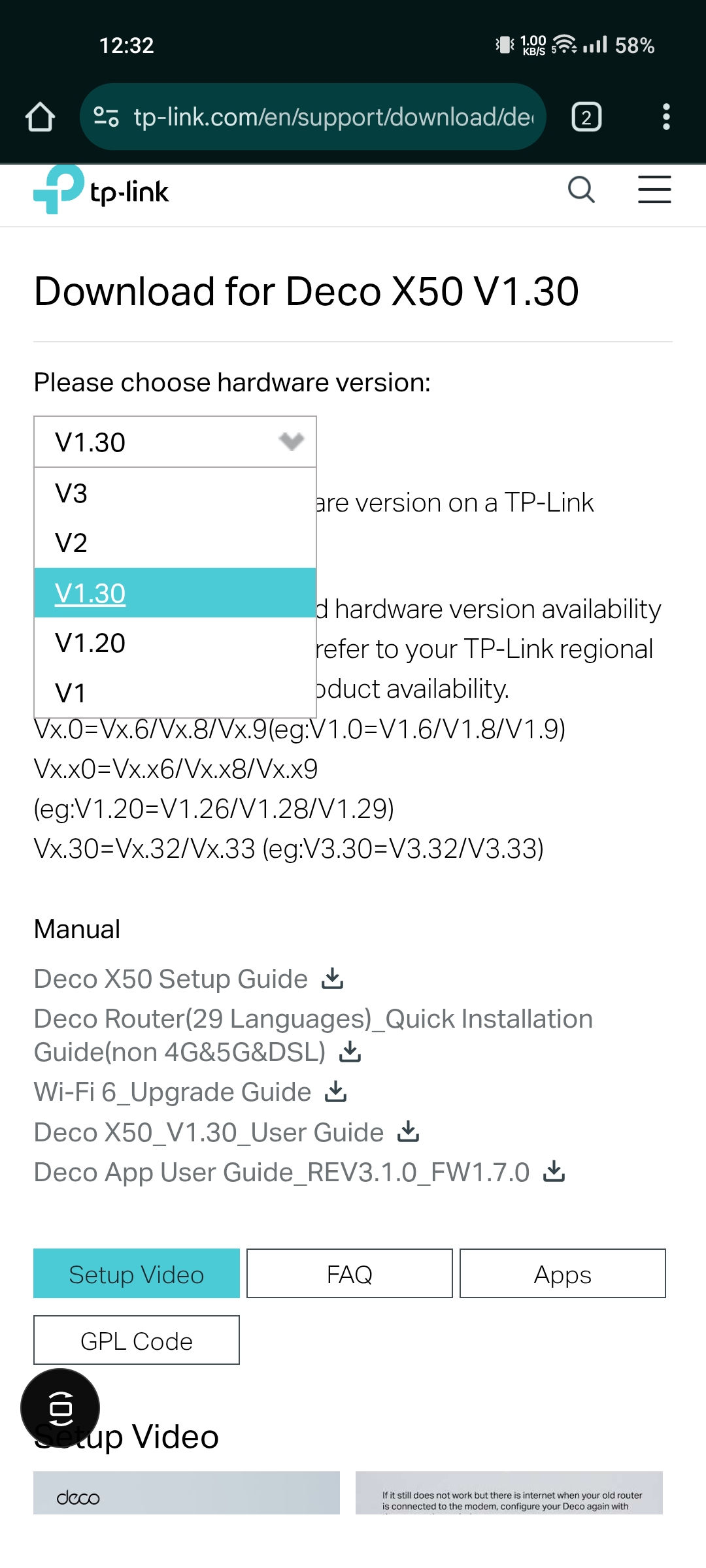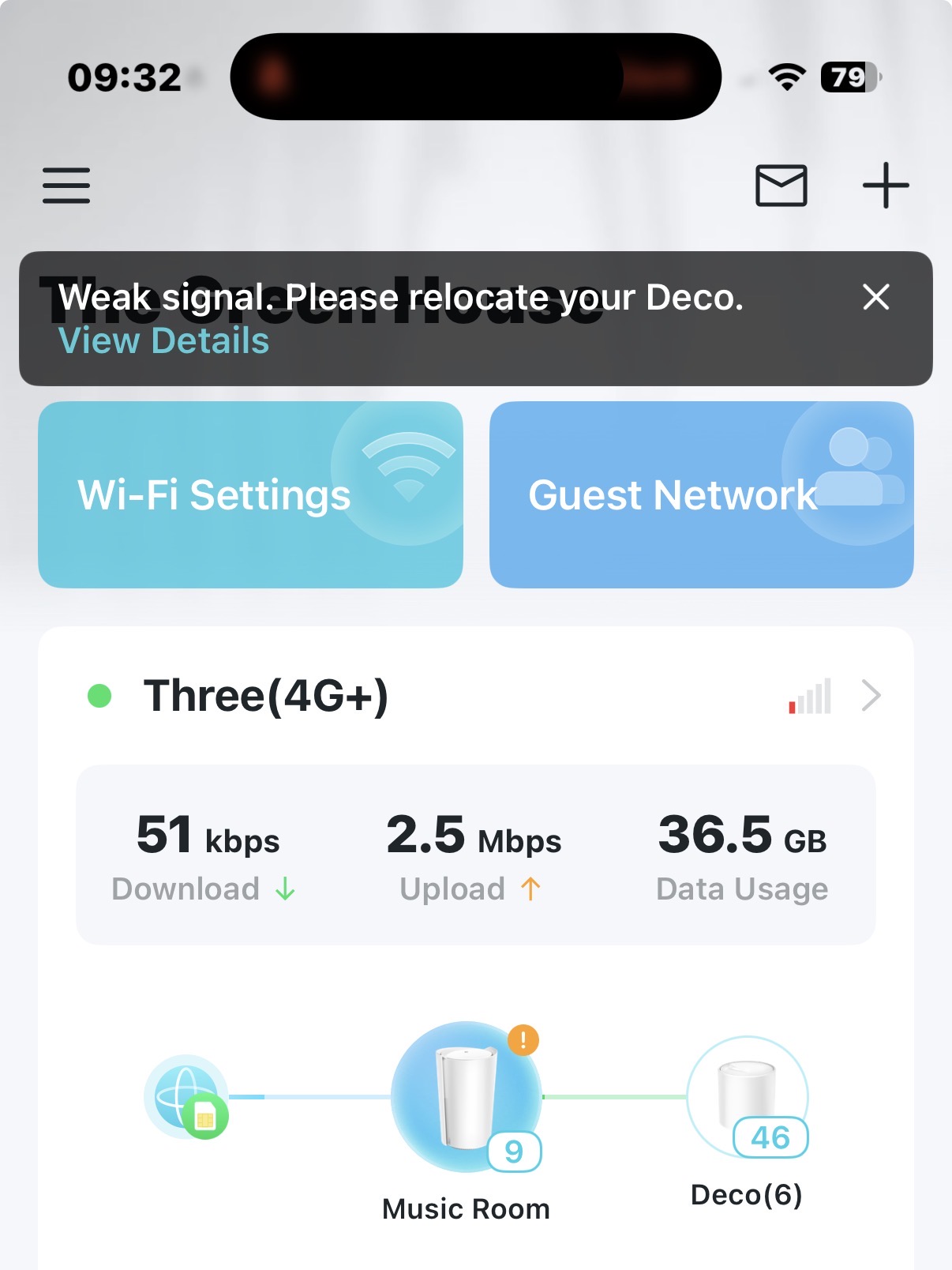Report
Well, someone tell me, isn't this a discrimination? Why is there no support for Deco X50v1.30 on the EN website? There are no new features in it or we are not getting any updates. For almost a year, what is our main fault? Why is there such a difference with V1/160? We have been complaining and are not getting any good results. We should definitely buy it or make sure that such a hardware version is not brought to our country. TP Link should be completely boycotted. 😡😡😡😡 But I bought Deco X10 US version from our country. It supports US/Global/EU firmware. Isn't it strange? TP Link must come out of this discrimination.
https://www.tp-link.com/en/support/download/deco-x50/v1.30/

- Copy Link
- Subscribe
- Bookmark
- Report Inappropriate Content
@SayeemAhmed Yeah exact same problem Deco X50 V1.30 is only available in Pakistan 😭 No other version available.
- Copy Link
- Report Inappropriate Content

It's odd. The whole X50 series appears to be largely ignored by TP-Link whereas the X55 series seems to be first out of the box for firmware and feature upgrades despite it being identical to the X50 (I cannot identify a difference).
Buying and fitting an X50-Outdoor Deco means Eco Mode is dropped as it doesn't support it yet.
Buying and fitting an X50-5G loses you Beamforming and EasyMesh compatibility (and probably also doesn't support Eco Mode, who knows).
It strikes me there is no set roadmap for firmware and feature updates for the various ranges. The coding team must just be poorly organised by their managers with an "all or nothing" approach to workload.
I occasionally dig out my worthless Deco collection (no one wants my 3 x X55, 2 x X60, 1 x X50-Outdoor and X50-5G, even for free) in the hope things have improved, but sadly I am only deluding myself. I purchased the X50-5G in the hope of replacing my aging Huawei 5G modem and at the same time filling a gap in my setup, but sadly more features disappeared from the app and now I am getting regular internet dropouts for no apparent reason whereas the Huawei sited in exactly the same position as the Deco was always reading the ful 5 bar signal strength. I posted about this on the forum but received no response.
Deco products and services regularly disappoint.
- Copy Link
- Report Inappropriate Content
@SteveWex so sad😔😔😔😔
- Copy Link
- Report Inappropriate Content
These are my observations regarding the challenges associated with firmware management.
The primary issue with the Deco product line involves hardware and firmware fragmentation. For example, the X50 model has five different hardware versions, each requiring separate firmware updates. This situation complicates management across approximately 58 different models within the United States. Additionally, this does not account for models in other countries, which may not be available in the U.S. Currently, TP-Link lacks a standardized update strategy and a unified hardware versioning system, which would facilitate automatic and staged firmware updates (e.g., transitioning from version 1.10.0 to 1.11.0).
I have recommended that the organization establish standardized hardware platforms to streamline firmware updates across all models. This approach would be implemented incrementally until full standardization is achieved. Although this has been discussed internally, no formal approval has been obtained.
Organizational factors, rather than any form of discrimination, appear to influence these challenges. The size of the engineering team is not explicitly clear; however, moderators such as David, Carl, Ryan, and Riley do not have influence over firmware development schedules or prioritization. The current focus is on bug fixes, security enhancements, and recruiting beta testers. Firmware development remains the primary challenge. Efforts to address these issues are ongoing.
Tagging @David-TP in this post he may be able to provide you with more detail.
- Copy Link
- Report Inappropriate Content
@HelpFixDecoApp But they should get out of this discrimination as soon as possible.
- Copy Link
- Report Inappropriate Content
I agree they need to fix there firmware asap. I am still trying to get them to fix it but I have a feeling its a decision above the level of forum support/engineers. I suggest you make a post here asking what tp link is going to do in regards to the lack of firmware updates for your model as well as other models. If enough people up vote it maybe those involved in the decision making at tp link will get this problem fixed.
- Copy Link
- Report Inappropriate Content
It's not difficult to understand.
Too many products for the firmware team to keep up with.
So TP-Link either need to employ more staff on the firmware team, or they need to stop introducing models every few months that are barely out of Beta testing.
Proof of this is the X50-5G which since release 2 years ago is still unstable despite a couple of pathetic attempts at correcting. And they've introduced a BE/Wifi7 version now, so they have to deal with that too.
Thankfully I used Amazon to trial the X50-5G as despite the many threads on the problems, I thought it might be pretty good, but I was wrong, it's terrible with constant drop-outs and low signal compared to the identically sited Huawei I was going to replace.
And that's not the worst case, the X50-Outdoor still has not got Eco-Mode to match the X50/X55/X60 etc rendering that feature pointless.
And if the firmware team aren't going to read these forums, what is the point of them? Relying on one person, who may or may not have balls to relay all/some/none of the information in these forums to a management team that clearly have no interest in anything but budget is also pretty pointless.
- Copy Link
- Report Inappropriate Content
I agree. The only way to fix the problem is to stop releasing new deco units unit the firmware is fixed but that in itself isn't enough IMO. If they are going to release new models then the firmware for those models should be on hardware platform 1.12.0 (which is the platform with the most options as I'm typing this) right out of the box. So new buyers are not mislead that their brand new router has an option that's listed on the box that's not in the firmware yet.
They also need to get rid of the damn hardware versions or come up with a way so they only have to write one firmware that will work with all the hardware versions.
As for the team who writes all the firmware I cant say for sure if they read the forums or not. On the US forums we will have users send in a forum escalation email at times which is viewed by the engineers but I'm not sure if they write the firmware or not.
On the en forums we ask for the app log which is then sent to the engineers by David.
Only thing I can say for sure is just keep posting about it. I'm hoping if enough people complain that the people who are in charge will get the message and get things fixed.
- Copy Link
- Report Inappropriate Content
If indeed they are releasing products with options listed but are not available, that would be contra to many country's advertising regulations including the UK and here in Ireland. I know this as this is the industry I work in (retail compliance).
If there are cases of this, and if I am informed of them, I will report them to my local advertising standards committee.
The only reason I know the firmware team do not read these forums is that I read it somewhere within one of the threads. If indeed David is the only Admin here, that only exacerbates the problem and goes some way to prove the manpower quota is below what is needed.
I cannot keep posting as I have 2 weeks before the return window closes on the X50-5G. Sadly I am stuck with the remainder (3 x X55, 2 x X60 and 1 x X50-Outdoor), I can't even give them away, and yes, I have tried!
- Copy Link
- Report Inappropriate Content
Please review the discussion here:
https://community.tp-link.com/en/home/forum/topic/845490?replyId=1624730
If you have any concerns about the firmware release plans, please reach out to the local service center.
Thank you very much.
Best regards.
- Copy Link
- Report Inappropriate Content
Information
Helpful: 1
Views: 512
Replies: 10
